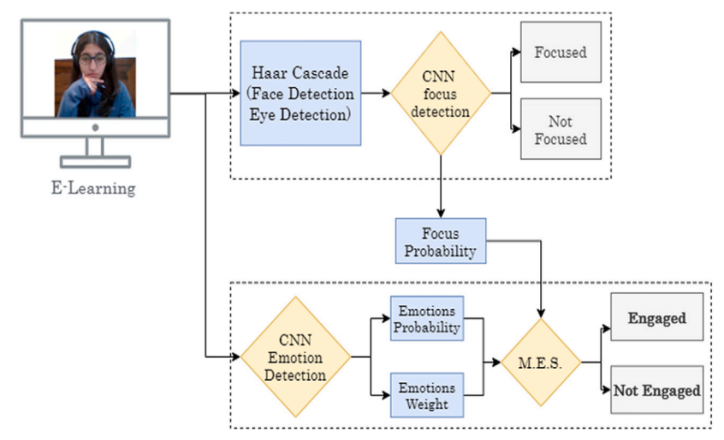Exploring the Effectiveness of AI Algorithms in Predicting and Enhancing Student Engagement in an E-Learning
Main Article Content
Abstract
The shift from traditional to digital learning platforms has highlighted the need for more personalized and engaging student experiences. In response, researchers are investigating AI algorithms' ability to predict and improve e-learning student engagement. Machine Learning (ML) methods like Decision Trees, Support Vector Machines, and Deep Learning models can predict student engagement using variables like interaction patterns, learning behavior, and academic performance. These AI algorithms have identified at-risk students, enabling early interventions and personalized learning. By providing adaptive content, personalized feedback, and immersive learning environments, some AI methods have increased student engagement. Despite these advances, data privacy, unstructured data, and transparent and interpretable models remain challenges. The review concludes that AI has great potential to improve e-learning outcomes, but these challenges must be addressed for ethical and effective applications. Future research should develop more robust and interpretable AI models, multidimensional engagement metrics, and more comprehensive studies on AI's ethical implications in education.
Article Details
References
R. M. D. Albuquerque, A. A. Bezerra, D. A. D. Souza et al., “Using neural networks to predict the future performance of students,” in Proceedings of International Symposium on Computers in Education (SIIE), pp. 109–113, Setubal, Portugal, November 2015.
M. Hussain, W. Zhu, W. Zhang, S. M. R. Abidi, and S. Ali, “Using machine learning to predict student difficulties from learning session data,” Artificial Intelligence Review, pp. 1–27, 2018.
A. A. Freitas, Data Mining and Knowledge Discovery with Evolutionary Algorithms, Springer, Berlin, Germany, 2022.
C. Villagrá-Arnedo, F. J. Gallego-Duraìn, P. Compan?-Rosique, F. Llorens-Largo, and R. Molina-Carmona, “Predicting academic performance from behavioural and learning data,” International Journal of Design & Nature and Ecodynamics, vol. 11, no. 3, pp. 239–249, 2016.
N. Z. Zacharis, “A multivariate approach to predicting student outcomes in web-enabled blended learning courses,” Internet and Higher Education, vol. 27, pp. 44–53, 2015.
J. Luan and C.-M. Zhao, “Practicing data mining for enrolment management and beyond,” New Directions for Institutional Research, vol. 2006, no. 131, pp. 117–122, 2006.
Z. Kovacic, “Early prediction of student success: mining students’ enrolment data,” in Proceedings of Informing Science and IT Education Conference (InSITE), pp. 647–665, Open Polytechnic, Cassino, Italy, June 2020.
A. Wolff, Z. Zdrahal, A. Nikolov, and M. Pantucek, “Improving retention: predicting at-risk students by analysing clicking behaviour in a virtual learning environment,” in Proceedings of Third International conference on Learning Analytics and Knowledge, pp. 145–149, Leuven, Belgium, April 2019.
I. Jung, S. Choi, C. Lim, and J. Leem, “Effects of different types of interaction on learning achievement, satisfaction and participation in web-based instruction,” Innovations in Education and Teaching International, vol. 39, no. 2, pp. 153–162, 2022.
J. Roberts and R. Styron, “Student satisfaction and persistence: factors vital to student retention,” Research in Higher Education Journal, vol. 6, no. 3, pp. 1–18, 2020.
C. Romero, M.-I. López, J.-M. Luna, and S. Ventura, “Predicting students’ final performance from participation in on-line discussion forums,” Computers & Education, vol. 68, pp. 458–472, 2019.
S. Sathyadevan and R. R. Nair, “Comparative analysis of decision tree algorithms: ID3, C4.5 and random forest,” in Proceedings of International Conference on Computational Intelligence in Data Mining, New Delhi, India, December 2018.
E. A. Skinner and J. R. Pitzer, “Developmental dynamics of student engagement, coping, and everyday resilience,” in Handbook of Research on Student Engagement, S. L. Christenson, A. L. Reschly, and C. Wylie, Eds., pp. 21–44, Springer, Berlin, Germany, 2022.
T. M. Lakshmi, A. Martin, R. M. Begum, and V. P. Venkatesan, “An analysis on performance of decision tree algorithms using student’s qualitative data,” International Journal of Modern Education and Computer Science, vol. 5, no. 5, pp. 18–27, 2017.
W. W. Cohen, “Fast effective rule induction,” in Proceedings of Twelfth International Conference on Machine Learning, pp. 115–123, Tahoe City, CA, USA, July 2021.
M. P. O’Mahony, P. Cunningham, and B. Smyth, “An assessment of machine learning techniques for review recommendation,” in Proceedings of Irish Conference on Artificial Intelligence and Cognitive Science, pp. 241–250, Springer, Dublin, Ireland, August 2019.
H. Mousa and A. Maghari, “School student’s performance prediction using data mining classification,” International Journal of Advance Research in Computer and Communication Technology, vol. 6, no. 8, pp. 136–141, 2017.
B. Bahati, F. Uno, and M. Tedre, “Can student engagement in online courses predict performance on online knowledge surveys?” International Journal of Learning, Teaching and Educational Research, vol. 16, no. 3, pp. 73–87, 2017.
S. S. A. Hamid, N. Admodisastro, N. Manshor, A. Kamaruddin, and A. A. A. Ghani, “Dyslexia adaptive learning model: student engagement prediction using machine learning approach,” in Advances in Intelligent Systems and Computing, R. Ghazali, M. Deris, N. Nawi, and J. Abawajy, Eds., pp. 372–384, Springer, Berlin, Germany, 2018.
M. L. Bote-Lorenzo and E. Gomez-Sanchez, “Predicting the decrease of engagement indicators in a MOOC,” in Proceedings of Seventh International Conference on Learning Analytics and Knowledge, pp. 143–147, Vancouver, British Columbia, Canada, March 2017.
H. M. Marks, “Student engagement in instructional activity: patterns in the elementary middle and high school years,” American Educational Research Journal, vol. 37, no. 1, pp. 153–472, 2020.
G. D. Kuh, “Assessing what really matters to student learning inside the national survey of student engagement,” Change: The Magazine of Higher Learning, vol. 33, no. 3, pp. 10–17, 2021.
T. Rodgers, “Student engagement in the e-learning process and the impact on their grade,” International Journal of Cyber Society and Education, vol. 1, no. 3, pp. 143–156, 2018.
R. Kabra and R. Bichkar, “Performance prediction of engineering students using decision trees,” International Journal of Computer Applications, vol. 36, no. 11, pp. 8–12, 2021.
A. K. Sharma and S. Sahni, “A comparative study of classification algorithms for spam email data analysis,” International Journal on Computer Science and Engineering, vol. 3, no. 5, pp. 1890–1895, 2021.

